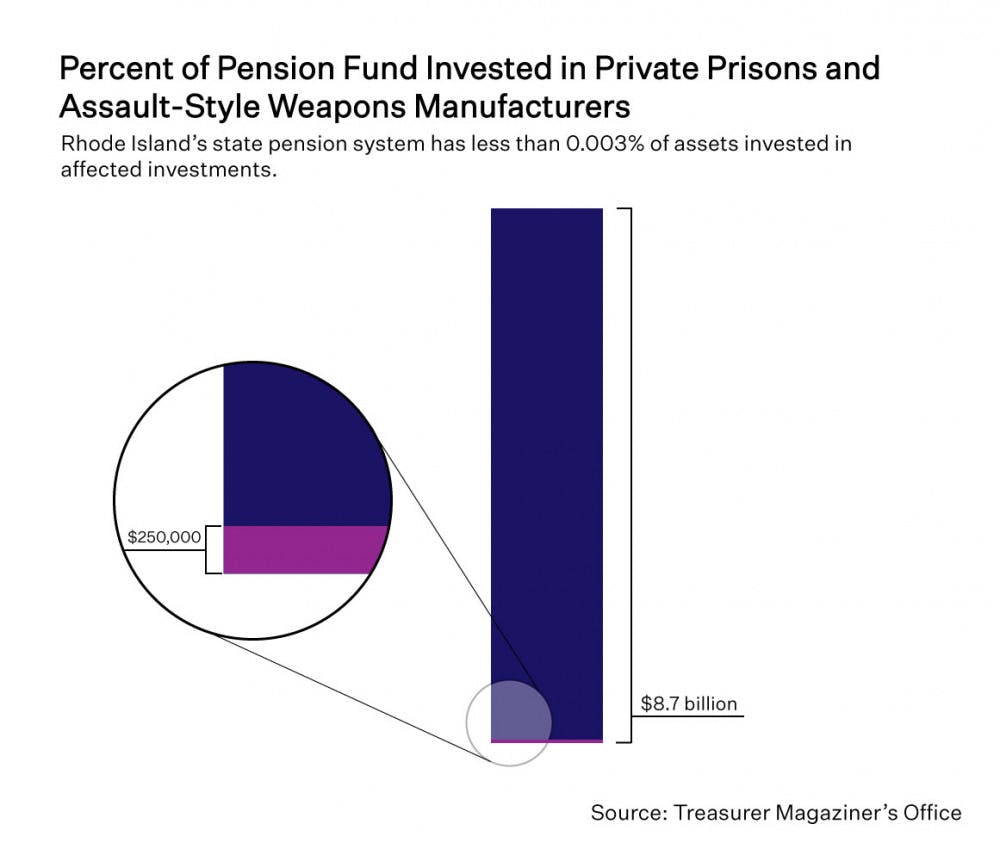On Jan. 31, the Rhode Island public pension fund ceased to invest in companies that either operate for-profit prisons or manufacture assault-style weapons sold to civilians, Treasurer Seth Magaziner ’06 D-RI announced.
At the time of the announcement, the state’s public pension system had less than $250,000 invested in the two industries, amounting to just 0.003 percent of the state’s $8.7 billion pension fund, according to a press release. The action will prompt Rhode Island to withdraw its investment from two for-profit prison operators — CoreCivic Inc. and Geo Group Inc. — and two assault weapon manufacturers — American Outdoor Brands Corp. and Sturm Ruger & Co. All four corporations rank among the largest publicly traded for-profit prison and firearm companies in the country.
The State Investment Commission, which oversees the pension fund and voted unanimously in favor of divestment, determined that the step would have “virtually no (economic) impact on the state system whatsoever,” Magaziner told The Herald. Despite the small financial change, Magaziner hopes that the decision will send a loud message about community principles.
Such sentiments were echoed by State Rep. Justine Caldwell, D-East Greenwich, who affirmed that the divestment “makes sure that we are living up to Rhode Islanders’ values.”
There is still more to be done, Caldwell stressed. Caldwell, along with State Sen. Joshua Miller, D-Cranston, is pressing for legislation banning the sale of assault rifles and high-capacity magazines.
Magaziner cited a series of moving testimonies given by mass shooting survivors at the Rhode Island State House last year as “powerful motivators” for his divestment recommendation to the State Investment Commission.
With regard to for-profit prisons, Magaziner cited community activism throughout the past year as another influencing factor in his support of divestment. “This is an issue that has garnered more attention locally over the past year with a series of protests at the Wyatt Detention Center,” he said. The Wyatt is a publicly-owned, privately-operated detention facility located in Cranston, R.I. The protests brought fairness and human treatment in prisons to the forefront of dialogue, Magaziner said.
Gabe Mernoff ’22, who was present at the Treasurer’s announcement, described the day as a “symbolic” end to “profiting off of human suffering.” Mernoff is co-director of University student group Thoughts Prayers Action, an organization dedicated to the prevention of gun violence in Rhode Island.
“The state should be using its fiscal power when it can to stop a nationwide epidemic” of gun violence, Mernoff said.
He continued that the divestment decision has the potential to energize and mobilize community organizers working for gun safety. “This year, there’s finally a unified Campaign for Gun Violence Prevention,” he said. “Having state officials that have indicated support and are on our side adds momentum to this campaign.”
Regarding possible divestment of the R.I. public pension fund from other industries which cause public harm — such as the fossil fuel industry — Magaziner stated his view that shareholder activism can better serve some causes than full divestment. Shareholder activism describes efforts by investors to change companies’ practices from within by leveraging their influence as partial owners. Magaziner noted that the state pension fund recently secured an agreement from Williams Companies, a natural gas company, to reduce fossil fuel emissions.
“The shareholder activism program has been producing some positive results,” Magaziner said. “We can make more of a difference to our climate and a range of other issues through it.”





